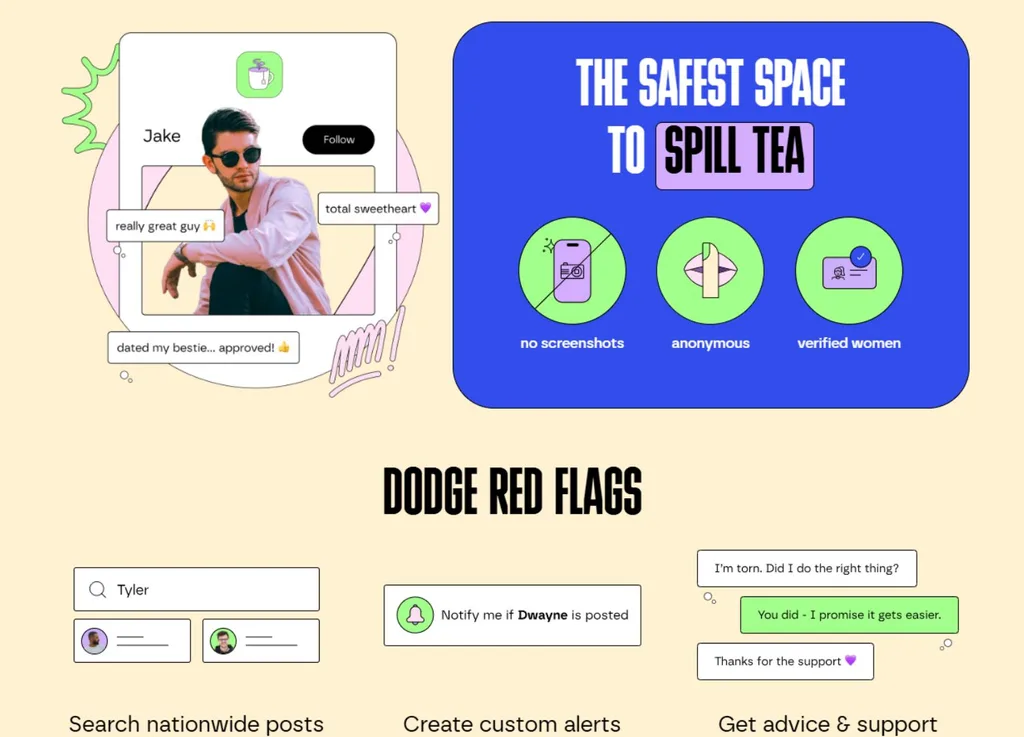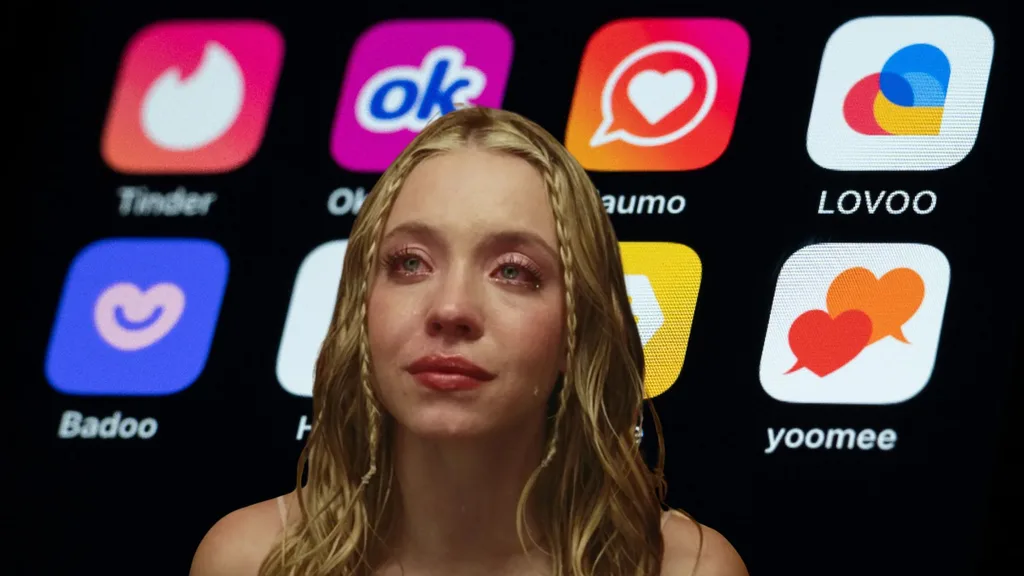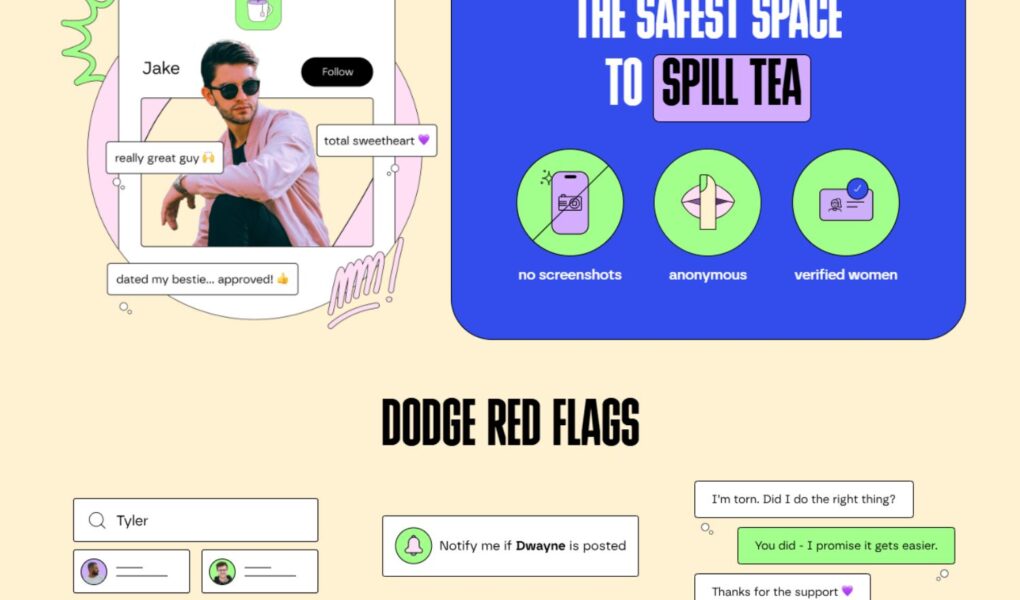Views: 159
THE RUNDOWN:
- The Tea App is a women’s safety dating advice platform where women can submit prospective dates for review and find out if they’re married, have a history of domestic violence or sexual assault
- It’s marketed as a solution to everything from catfishing and assault to ghosting behaviours widespread across the apps
- The app experienced a spike in downloads on the App Store in late June which was quickly followed by a hack coordinated by an anti-women 4chan group.
- There are concerns that innocent men are having their privacy invaded, but investigations have shown that mainstream dating apps like Hinge and Tinder are not doing enough to protect women from sex offenders.
Last week, a disruption hit Apple’s App Store when Tea, a dating-advice app that allows women to rate and review men, surged past favourites like ChatGPT and Threads in downloads. Tea For Women has been downloadable since 2023. The app enables women to screen potential dates across apps like Hinge, Tinder, Raya and Feeld for abusive or criminal behaviour by uploading a prospective match’s photo. The app’s explosion in popularity happened to coincide with the viral news of Astronomer CEO Any Byron’s infidelity at a Colplay concert.
However, shortly after the spike in downloads, Tea was targeted by a cyberattack orchestrated via the right-wing message board 4chan. According to the BBC, 72,000 images — including 13,000 verification photos and government IDs of female users — were compromised.
Tea founder Sean Cook is currently scrambling to resolve the breach. The incident, meanwhile, has sparked debate around the ethics of “whisper groups,” which, over the last decade, as we’ve moved to app-based dating, have proliferated on Facebook and Reddit, where women have been informally sharing their experiences with dates that range from bad to dangerous. Men feel their privacy has been invaded, and women, following the breach, feel there’s no safe place on the internet.
What Is The Tea App?

Tea, a women-only dating safety app with 1.6 million users, enables women to vet potential dates. Sean Cook launched the platform in November 2022, inspired by his mother’s harrowing experiences with online dating. “I was shocked by how easy it was for catfish, scammers and criminals to take advantage of women on dating apps and how little traditional dating apps do to protect users.”
Beyond criminal history checks, Tea allows women to flag men for personal issues —ghosting, poor hygiene, or even not reciprocating oral sex. Users can even set alerts for certain names. These alerts could ensure you’re notified if someone who abused you on a date joins the platform, and have a chance to warn other women. But it also leaves the door open for airing of petty grievances. It’s also a fantastic opportunity to share with other women that your ex, who broke your heart, is closer to 5’10 than 6’2, has a Scorpio venus (red flag), and an annoying relationship with his mum.
It’s very in line with a current mood described as “heteropessimism” that’s been used to describe straight women’s attitudes to dating. Essentially, they’ve given up, and any strategy that avoids more grief and humiliation is legitimate, even if it causes grief and humiliation to its subjects.
The Problem With Tea App And Sis, Is This Your Man Facebook Groups

Female users clearly appreciate tea. Women clearly appreciate Tea. “The amount of heartache and wasted energy this app has saved me is wonderful,” wrote one user. Another adds, “I wish Tea had come out 10 years ago!” But men are anxious about having their photos and personal information shared without consent, and increasingly, Facebook groups that are facilitating this kind of sharing are facing lawsuits for defamation and privacy violations (some successfully, some less successfully). Following one such case in Australia, group admins on the group Sis, Is This Your Man? warned users about the “revenge posting” they were seeing reminding them about the defamation risks associated with slanderous content and reporting they had been fielding posts from women with Apprehended Violence Orders (AVOs) from previous partners or making spiteful posts to sabotage ex lovers relationships.
Most single people are trapped in the badlands of dating apps, sweating over cringey prompts and trying to select “candid” photos as we vie to avoid becoming members of the 4b movement and dying alone. It’s inherently awkward. Many apps soften the blow with contact‑blocking tools, so your boss or your family don’t get front‑row seats to your search for intimacy. But platforms that actively target dating‑app users break the unspoken social contract: we avoid embarrassing each other more than we have to.
One man, known to ELLE Australia, found a screenshot of his dating app profile on a local review group. While the reviews were positive, this didn’t save him the embarrassment of everyone in his network raising their eyebrows at the sheer number of them.
However, while Nice Guys are getting embarrassed, the consequences for women not vetting their dates are much higher, as some of the largest apps are failing to do their jobs.
Women Are Not Safe On Dating Apps
Sean Cook is not wrong. Mainstream dating apps remain profoundly unsafe spaces for women. Match Group, the owner of apps like Tinder and Hinge, controls nearly half of the online dating market and has repeatedly come under scrutiny for failing to protect its users adequately. Most notably, Stephen Matthews, who despite being reported at least 15 times for rape and drink-spiking on these platforms, wasn’t removed until his arrest and conviction in 2024, where he received 158 years in prison for assaulting women he’d met via dating apps.
Laura Wolf, an attorney involved in Matthews’ case, remarked, “It is shocking that for years after receiving reports of sexual assault, Hinge continued to allow Stephen Matthews access to its platforms.”
In 2022, a Brigham Young University study revealed assaults facilitated via dating apps occurred faster, were more violent, and predominantly targeted vulnerable individuals—60% of survivors self-reported mental illness. Despite hiring a trust-and-safety team in response, Match Group disbanded it by 2024. Former Match Group safety moderator Michael Lawrie told The Guardian bluntly, “I don’t think [dating apps] are safe enough at the moment. They’re going to get worse. I’m hoping dating sites vanish”
Incidentally, Match Group is currently the subject of a class action for unlawfully misleading app users and violating false advertising and deceptive trade practices laws.
Is Tea A Necessary Evil?

On the Brat Green Tea site, the “Use Tea To” banner promises to help you “Avoid Red Flags,” “Swipe Safely,” and “Protect Your Heart.” It tracks with the moment: modern dating is messy, and we’ve become obsessed with red flags. However, psychologists warn that hyper-vigilance online can turn dating into a retail experience, prompting us to over-interpret subtle signals that don’t align with real-world behaviour. The result? One‑strike rules—“if he wanted to, he would”—and a requirement to post relationships on social, which reduce nuanced connections to checklists.
Centuries of literature and human experience tell us that even when we can see red flags, we ignore them. Vronsky in Dostoevsky’s Anna Karenina would be described as a “fuck boy”, but his multitude of red flags didn’t stop the titular heroin from falling for him. In Sally Rooney’s Normal People, Callum and Marianne’s many incompatibilities don’t stop them from returning to each other like magnets for great sex and a lot of crying. Essentially, whether you meet in person or online, there is no guaranteed way to “protect your heart.” And while it feels like it should be illegal, it’s actually not illegal for someone to reject you, ghost you, break your heart or be really bad at sex. Even if they’re Paul Mescal.
However, for women, there is also no guaranteed way to protect oneself from assault on apps short of turning to other women in the groups we’ve spent this article criticising.
Dating apps that control our access to potential partners have refused to do their due diligence, exposing women to extreme harm and providing malicious predators (not just Geminis who can’t articulate their feelings) unfettered access to a pool of potential victims. With overwhelming evidence that we can’t trust the apps supposedly designed to help us find the love of our lives and/or great sex to protect us from sometimes life-ruining and life-threatening experiences, apps and Facebook groups that are sometimes unfair, and frequently make men uncomfortable, will proliferate.
The post Men Hate The ‘Rate And Review’ Tea App, Women Hate That It Has To Exist appeared first on ELLE.



